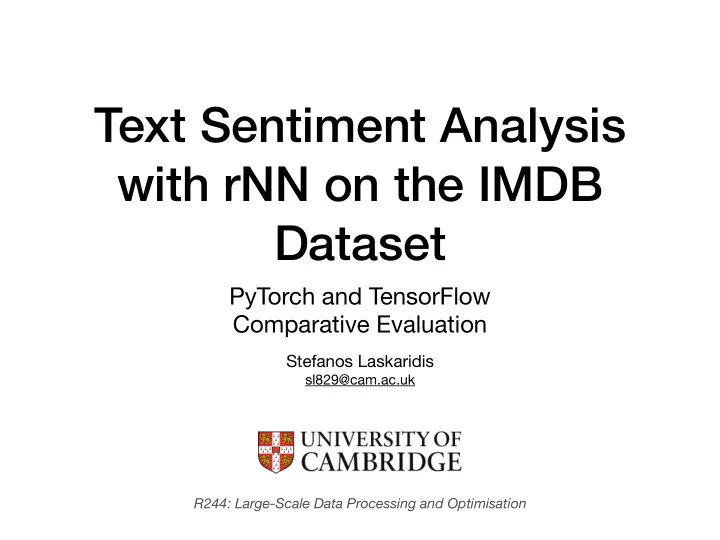

Text Sentiment Analysis with rNN on the IMDB Dataset PyTorch and TensorFlow Comparative Evaluation Stefanos Laskaridis sl829@cam.ac.uk R244: Large-Scale Data Processing and Optimisation
Recurrent Neural Networks output . . . recurrent ... recurrent block output Legend . . . output gate LSTM block unweighted connection + output weighted connection . . . recurrent ... ... connection with time-lag peepholes h input branching point recurrent SRN . . . mutliplication unit + cell + g sum over all inputs recurrent + . . . gate activation function forget gate ... (always sigmoid) + input + input activation function input gate g ... ... ... (usually tanh) g input input recurrent output activation function block input h (usually tanh) + ... ... input recurrent Images taken from [5] and [6] 2
Sentiment Analysis • Make out the general sentiment The IMDB dataset of a sentence. • Based word vectors, ngrams, word embeddings, etc. • Binary or Multiclass classification in di ff erent sentiments. Embedding output output output ... recurrent ... recurrent ... recurrent ... ... ... recurrent recurrent recurrent block output block output block output ... ... ... output gate output gate output gate LSTM block LSTM block LSTM block + + + ... ... ... peepholes peepholes peepholes h input h input h input recurrent recurrent recurrent ... ... ... + cell + cell + cell recurrent recurrent recurrent + + + ... ... ... ... forget gate ... forget gate ... forget gate input + input + input + input gate input gate input gate ... ... ... g input g input g input block input block input block input + + + ... ... ... ... ... ... output output output ... recurrent ... recurrent ... recurrent ... ... ... recurrent recurrent recurrent block output block output block output ... ... ... output gate output gate output gate LSTM block LSTM block LSTM block + + + ... ... ... peepholes peepholes peepholes h input h input h input recurrent recurrent recurrent ... ... ... + cell + cell + cell recurrent recurrent recurrent + + + ... ... ... ... forget gate ... forget gate ... forget gate input + input + input + input gate input gate input gate ... ... ... g input g input g input block input block input block input + + + ... ... ... ... ... ... 3
PyTorch vs. TensorFlow • Python implementation of Torch • Multiple frontends: C++, Python, (Lua) Java, Go • Imperative programming model • Declarative API • Imperative API through Eager [3] • Great integration with Python • Data Flow graphs, with partial graph • Beta version execution • CPU, GPU • CPU, GPU, TPU, Mobile (TensorFlow Lite) • Facebook, CMU, Stanford, NYU, • Google, AirBnb, Uber, SAP , ebay, Intel ParisTech, ENS, … Images taken from [1] and [2] 4
Significance • Research: • Prominent Question: Have you tried using DNN? • Programming paradigm is shifting • Induction, data-centric approach • TensorFlow and PyTorch are among the primary tools used by the industry and academia • RNNs are great for data with temporal relations (e.g. text, speech) 5
Exploration • Evaluate how the top 2 Deep Learning Frameworks perform in CPU-only computations • Lack of available Nvidia GPU :( • and a Google TPU :( • Maybe test on Public Cloud - Amazon Spot Instances? • Can you do “Deep” learning on CPUs? • Explore the limits on a “commodity” laptop • How far can “fast-prototyping” go? 6
Working Plan Today Christmas Deadline 28/11 16/01 • Deliverables: • So far: • Di ff erent RNN depths and • Tools installations and architectures comparative benchmarks playground setup • Accuracy benchmarks • Dataset exploration • Computability benchmarks • API familiarisation • Results interpretation 7
Thank you Q&A Stefanos Laskaridis sl829@cam.ac.uk 8
References 1.PyTorch http://pytorch.org/ 2.TensorFlow https://www.tensorflow.org 3.TensorFlow Eager https://research.googleblog.com/2017/10/eager-execution-imperative-define-by.html 4.IMDB Dataset http://ai.stanford.edu/~amaas/papers/wvSent_acl2011.pdf http://ai.stanford.edu/~amaas/data/sentiment/ https://s3.amazonaws.com/text-datasets/imdb.npz 5.http://colah.github.io/posts/2015-08-Understanding-LSTMs/ 6.http://karpathy.github.io/2015/05/21/rnn-e ff ectiveness/ 9
Recommend
More recommend